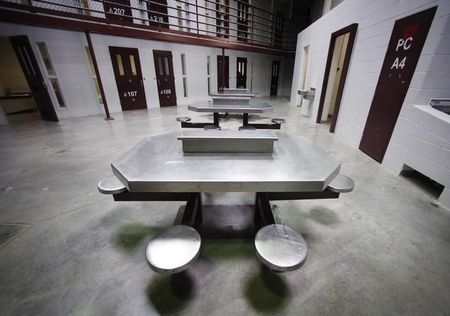By Lacey Johnson
WASHINGTON (Reuters) - Lawyers for a Syrian prisoner at the Guantanamo Bay prison urged a U.S. judge on Monday to halt harmful force-feeding practices used on their client during a hunger strike.
Abu Wa'el Dhiab, 43, has been held at the Cuban prison without charges for 12 years and was cleared for release by United States in 2009. According to a military spokesman, Dhiab is among more than 100 prisoners who have gone on a hunger strike.
"His hunger strike is not just a disciplinary problem, it's a cry for humanity," Dhiab's attorney, Eric Lewis, said in the hearing, in U.S. district court.
Lewis said the practise of forcibly removing Dhiab from his cell, restraining him and feeding him through a nasal tube was illegal and abusive.
According to medical records presented on Monday, Dhiab has suffered from nose bleeds, chronic back pain, blood in his urine and other medical problems.
Dhiab's lawyers are seeking an order that would make the force feedings more humane by allowing Dhiab to use a wheelchair instead of being forcibly removed from his cell by guards.
They have also requested that a doctor assess their client before each force feeding to confirm that his health is in danger, among other demands.
Government attorney Andrew Warden said the tube feeding was not a painful procedure. He added, "Providing medical care to Mr. Dhiab is challenging, your honour."
Warden said Dhiab had a history of verbally and physically abusing medical staff, as well as throwing urine and faeces.
He said Dhiab is allowed to use a wheelchair to attend the feedings and Guantanamo staff are providing "thoughtful, attentive and high-quality medical care."
On Friday U.S. District Judge Gladys Kessler ordered the government to prepare public versions of 28 videos that show Dhiab being force-fed.
The ruling came after a coalition of media organizations filed a motion to have the footage released. The government is expected to appeal the decision.

Plans to release prisoners such as Dhiab have been thwarted by difficulties in moving the detainees either to the United States or to their home countries.
(Reporting by Ian Simpson; Editing by Steve Orlofsky)
